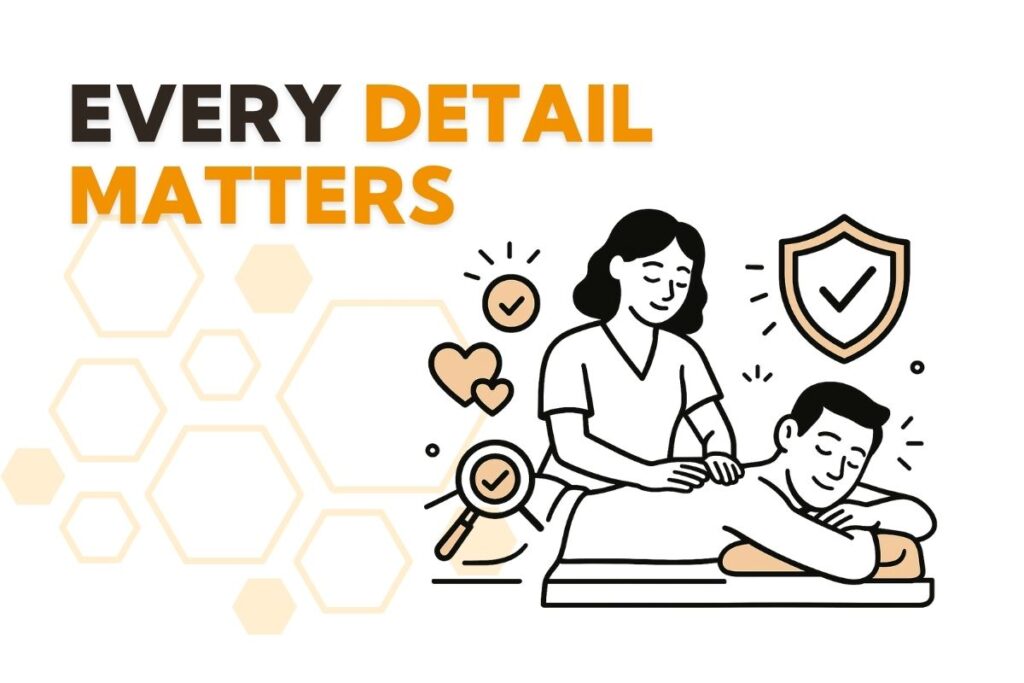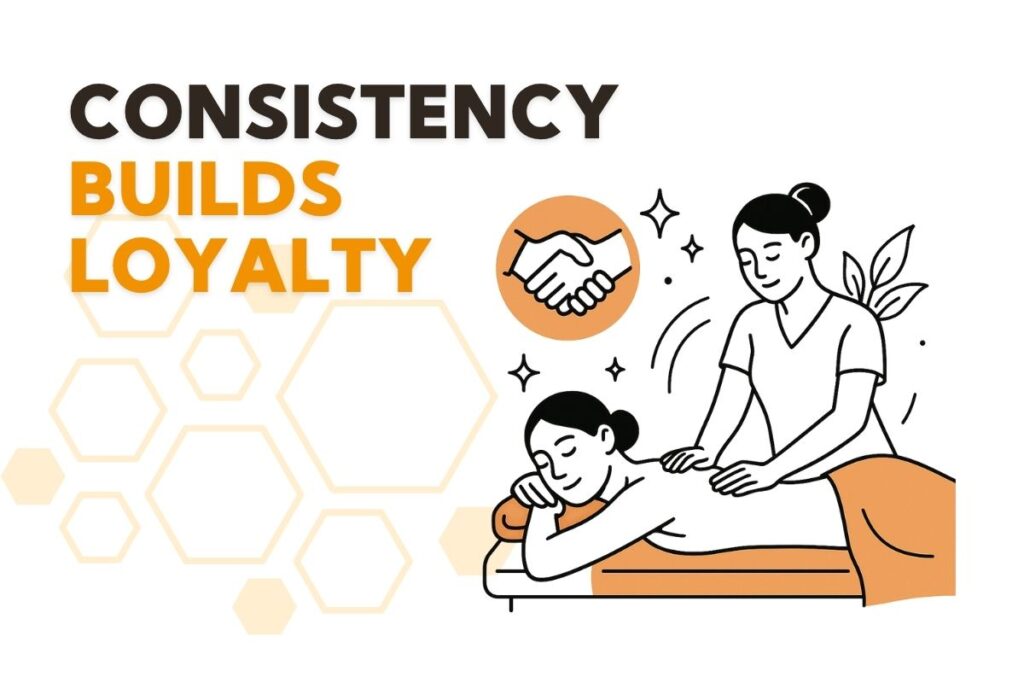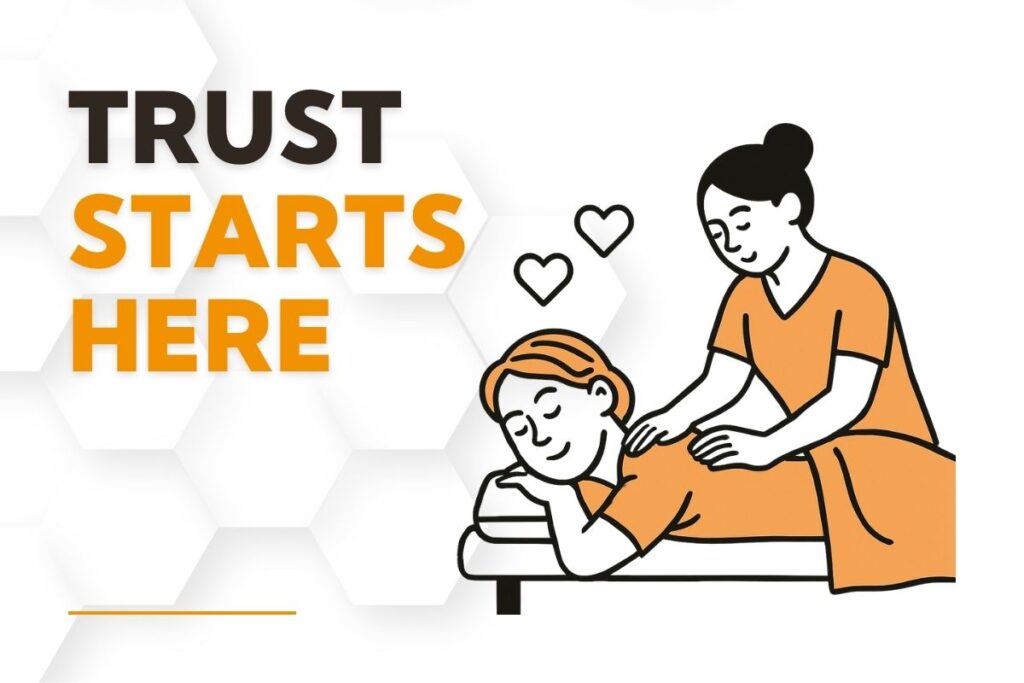Make Every First Visit Count
Building trust with new massage therapy clients is the foundation of a thriving, sustainable practice. That trust begins forming long before a client lies on the table—it starts the moment they find your clinic online, book their first appointment, or speak to your front desk. A first-time client decides whether to return not just based on the quality of the massage, but on how safe, understood, and respected they feel throughout the entire experience.
According to PwC, 73% of consumers say that customer experience heavily influences their buying decisions. In massage therapy, that experience is deeply personal. If trust isn’t established early, rebooking rates drop, word-of-mouth marketing stalls, and even the most well-executed promotional strategies fall short.
In this article, we’ll break down how to build trust with new massage therapy clients at every touchpoint—from online interactions to in-room communication—so you can turn first-timers into loyal regulars.
Understanding the New Client Perspective
New Clients Carry Preconceived Anxieties
Building trust with new massage therapy clients starts with understanding the emotional state they’re in when they walk through the door. Many feel nervous about not knowing what to expect during the session, have concerns about modesty or physical boundaries, or feel uncertain about your therapist’s qualifications—especially if they’ve had prior negative experiences elsewhere. Addressing these concerns early can significantly reduce client hesitation and create a more open environment.
Trust Begins Before the First Session
First impressions often happen online. Your website, intake forms, and booking systems all signal what a client can expect. A smooth, professional online experience builds confidence before a word is exchanged. Ensure your digital touchpoints reflect professionalism, ease of use, and clear communication.
Pro Tip: Use Hivemanager’s automated intake form feature to reduce pre-appointment confusion and demonstrate care before the client arrives.

Creating a Safe and Professional Clinic Environment
Cleanliness and Atmosphere Set the Tone
Building trust with new massage therapy clients involves more than technical skill. Clients are immediately put at ease by a clean, calm, and well-organized environment. From fresh linens and sanitized equipment to soft lighting and calming music, every detail signals professionalism. A comfortable waiting area with thoughtful decor and a welcoming receptionist can make all the difference.
Professionalism Is Felt, Not Just Seen
Your team’s behavior matters just as much as their technical skills. Therapists should be dressed in clean attire, arrive on time, and present themselves with calm confidence. These small cues help reassure clients they are in capable hands.
Communicating with Care and Clarity
Listen First, Speak Second
Building trust with new massage therapy clients means being fully present. A new client should feel heard, not rushed. Practicing active listening—asking open-ended questions, paraphrasing client concerns, and avoiding clinical jargon—helps you connect on a human level. When a client knows you’re genuinely listening, trust grows.
Clearly Explain Each Step
Transparency reduces anxiety. When clients understand what’s going to happen and why, they feel more at ease. Explaining what you’ll focus on, how the session is structured, and assuring them they can speak up at any time helps eliminate uncertainty. Even simple clarifications—like where to hang their clothes or how to position themselves on the table—can eliminate unnecessary stress.
Personalizing Every Session
Tailor Techniques to Their Needs
No two bodies—or clients—are the same. A personalized approach to treatment makes clients feel genuinely cared for. This might mean adjusting pressure based on real-time feedback, prioritizing problem areas identified in intake, or offering small comforts like bolsters or extra towels.
Real-World Example: A Sherwood Park-based clinic tracked client preferences using a secure notes system. When clients returned, therapists remembered details like favorite scents and pressure levels—leading to a 27% increase in rebooking.
Follow-Up That Feels Genuine
Following up after the session shows clients that your care doesn’t stop when they leave. Use email or SMS to check in, offer tips for home care, or suggest the best time for their next session based on your conversation.
Bonus Tip: Hivemanager’s automated follow-up messaging ensures your outreach is consistent without adding to your admin workload.
Establishing and Respecting Boundaries
Set Expectations from Day One
Boundaries build trust when communicated clearly. Clients should know what to expect in terms of behavior, consent, and policies. Displaying a client code of conduct, including consent check-ins throughout the session, and setting clear cancellation and rescheduling guidelines creates transparency and reassurance.
Train Staff to Model Respect
All team members—from front desk to RMTs—must treat clients with respect. This means asking permission before adjusting sheets or body positioning, avoiding assumptions, and being trained in handling sensitive conversations. Consistency in these behaviors reinforces safety and trust.

Using Technology to Build Confidence
Booking and Communication Should Be Seamless
A confusing or outdated booking system can damage trust before a session even begins. Your platform should be user-friendly, offer immediate confirmations, and allow clients to complete intake forms ahead of time. These simple conveniences reduce stress and present your clinic as competent and organized.
Keep Client Data Secure
Trust also means protecting your clients’ personal and health information. Choose secure software that limits data access, follows privacy regulations like PIPEDA or HIPAA, and makes clients feel confident that their details are safe. Hivemanager’s platform is designed to meet these standards without added complexity.
Encourage Social Proof and Referrals
Let Happy Clients Do the Talking
Satisfied clients are your most powerful marketing tool. Asking for reviews or testimonials after a positive session is a simple but effective way to build social proof. Let them know where to leave a review, and thank them personally when they do.
Create Gentle Referral Incentives
Referral programs that offer small thank-you gifts, such as a discount on their next visit or a free add-on service, can help spread your reputation. These gestures make clients feel appreciated and more likely to share their experience.
Measuring Trust Through Retention
Watch for Trust Signals in Your Metrics
You can’t measure trust directly, but you can track its effects. Key performance indicators include increased client retention, a higher number of second bookings, fewer cancellations, and improved satisfaction scores. Regularly reviewing these metrics offers insight into where your clinic is building—or losing—trust.
Review and Refine Regularly
Building trust with new massage therapy clients is an ongoing process. Set time each month to review client feedback, host brief team meetings, and discuss wins or concerns. When your staff shares responsibility for client care, trust becomes a collective effort.
Strengthen Loyalty from the First Hello
Building trust with new massage therapy clients doesn’t end when the session does—it’s reinforced in every interaction that follows. Clients return not only because the treatment was effective, but because they felt genuinely cared for, listened to, and safe throughout the experience. Trust is what transforms a good massage into a lasting relationship.
By weaving that sense of reliability into every aspect of your operations—from the tone of your confirmation emails to the way your therapists check in during treatment—you create a seamless, supportive journey that clients value and remember. And when trust becomes your clinic’s signature, client loyalty naturally follows.
FAQs
Create a calm, professional space and take time to explain the process clearly. Active listening and small reassurances help clients feel safe and respected from the start.
Trust allows clients to relax, communicate openly, and return regularly—it’s essential for effective treatment and long-term success.
Yes. Streamlined booking, automated reminders, and secure data handling show clients your clinic is reliable, organized, and cares about their experience.
High rebooking rates, referrals, and honest feedback are clear signs that clients feel safe, satisfied, and supported in your care.


